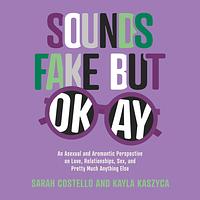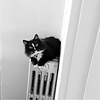Take a photo of a barcode or cover
The best part about this book for me was that it introduced me to the podcast, which I somehow had never come across before. The book reads like a podcast conversation, and the authors certainly include their host personalities in their writing. Since I listened to a bunch of episodes and got the gist of their vibes, this wasn't a shock to my system. However, if you go in expecting a regular book, that is not what you'll get. This is a podcast book. I'm wondering if that will be helpful in making the content more accessible to non-academic, non-queer theory types, but it wasn't for me. I do like the podcast though!
While I enjoyed the comments from podcast listeners and understand why Costello and Kaszyca wanted to include more voices, it did leave me feeling like the book was an incredibly informal, amateurish, and improperly written/researched qualitative study or something. The comments were the most interesting aspect of the book by far for me, and the analysis tying the common themes together was good, but the informality left a lot to be desired. Additionally, the authors felt the need to constantly add the qualifier that their perspectives were limited (yes, I get it, I picked up on that after you said it the first time and shared your personal stories), which was frustrating and took away from the ideas being discussed. I also have a strong dislike for when authors of informational nonfiction insert their snarky opinions on the subject matter throughout the text, so that was a negative aspect for me. I shouldn't be surprised since this is a podcast book, but I feel how I feel.
The chapter on gender covers ground explored in other asexual and gender texts, but I found the brief section on how asexual and aromantic folks have a tendency to feel detatched from gender to be relatable and intriguing. The comments from listeners were very similar to my feelings about my own gender (or lack thereof), and this is only the second time I've come across this kind of discussion.
In the end, this wasn't a bad book, but it wasn't a good book. More ace books out in the world is great, I'll take it, but there's nothing groundbreaking here. That said, it doesn't have to be. I think the possible increased accessibility of Sounds Fake But Okay is the book's strength.
Edit: I figured out why the book felt so weird to me and have lowered from 3 to 2 stars. Everything is filtered through the authors' personal lenses (white, middle class, college-educated, American, cis-women), which they acknowledge and seek to expand upon by including comments from their podcast listeners. However, their role as podcast hosts centers them and their experiences, and they write as though this is a podcast episode. The result is that the book comes off as them touting their experiences and opinions while occasionally filtering ideas from others as a way to strengthen their own legitimacy. Their role as podcast hosts, which centers their experiences, does not allow them to share personal stories without reinforcing the idea that the book is about THEM. Sounds Fake But Okay might be about the aspec lens, but being written by podcast hosts in the tone of their podcasts centers the authors, not the content. This makes the comments from listeners feel supplemental, not like genuine aspects of the arguments. This is why Angela Chen in Ace can discuss her personal experiences with asexuality without overtaking the stories of everyone else (I kept wondering why it worked for her but not for Costello and Kaszyca). Chem maintains distance as a reporter and does not center herself and her experiences. Whether Costello and Kaszyca wanted to or not, their role as podcast hosts inherently centers them in their podcast book, especially since they write with their podcast personas.
While I enjoyed the comments from podcast listeners and understand why Costello and Kaszyca wanted to include more voices, it did leave me feeling like the book was an incredibly informal, amateurish, and improperly written/researched qualitative study or something. The comments were the most interesting aspect of the book by far for me, and the analysis tying the common themes together was good, but the informality left a lot to be desired. Additionally, the authors felt the need to constantly add the qualifier that their perspectives were limited (yes, I get it, I picked up on that after you said it the first time and shared your personal stories), which was frustrating and took away from the ideas being discussed. I also have a strong dislike for when authors of informational nonfiction insert their snarky opinions on the subject matter throughout the text, so that was a negative aspect for me. I shouldn't be surprised since this is a podcast book, but I feel how I feel.
The chapter on gender covers ground explored in other asexual and gender texts, but I found the brief section on how asexual and aromantic folks have a tendency to feel detatched from gender to be relatable and intriguing. The comments from listeners were very similar to my feelings about my own gender (or lack thereof), and this is only the second time I've come across this kind of discussion.
In the end, this wasn't a bad book, but it wasn't a good book. More ace books out in the world is great, I'll take it, but there's nothing groundbreaking here. That said, it doesn't have to be. I think the possible increased accessibility of Sounds Fake But Okay is the book's strength.
Edit: I figured out why the book felt so weird to me and have lowered from 3 to 2 stars. Everything is filtered through the authors' personal lenses (white, middle class, college-educated, American, cis-women), which they acknowledge and seek to expand upon by including comments from their podcast listeners. However, their role as podcast hosts centers them and their experiences, and they write as though this is a podcast episode. The result is that the book comes off as them touting their experiences and opinions while occasionally filtering ideas from others as a way to strengthen their own legitimacy. Their role as podcast hosts, which centers their experiences, does not allow them to share personal stories without reinforcing the idea that the book is about THEM. Sounds Fake But Okay might be about the aspec lens, but being written by podcast hosts in the tone of their podcasts centers the authors, not the content. This makes the comments from listeners feel supplemental, not like genuine aspects of the arguments. This is why Angela Chen in Ace can discuss her personal experiences with asexuality without overtaking the stories of everyone else (I kept wondering why it worked for her but not for Costello and Kaszyca). Chem maintains distance as a reporter and does not center herself and her experiences. Whether Costello and Kaszyca wanted to or not, their role as podcast hosts inherently centers them in their podcast book, especially since they write with their podcast personas.
fast-paced
As someone who identifies outside of the ace spectrum, I didn’t necessarily expect to relate to this book when I first picked up the arc. I am, however, always curious about alternative perspectives when it comes to relationships and sexuality. Especially since my own views on the topic are considered outside of the social norm.
I very much liked how this was laid out, and how it was almost conversational. There was an ease and humour about the explanations that I appreciated as some of the concepts I was familiar with, and others were brand new. I always love an informative book that doesn’t make me feel dumb for not immediately understanding something.
My only real discourse with the novel has to do with: One, the number of fan testimonials to each chaptered subject—the sheer amount was repetitive and too much. And two, that there was a definite subtext of justifying the existence of aspec sexualities as valid sexualities. It seemed unnecessary to me that a book meant to promote an aspec view of sex and relationships would spend so much time attempting to convince its reader that such a view exists, when said reader would most likely already believe that, otherwise why would they pick this book up in the first place?
Overall, an interesting read that I would definitely recommend, especially for anyone interested in examining how social norms affect the formation of gender and sexual identity.
I very much liked how this was laid out, and how it was almost conversational. There was an ease and humour about the explanations that I appreciated as some of the concepts I was familiar with, and others were brand new. I always love an informative book that doesn’t make me feel dumb for not immediately understanding something.
My only real discourse with the novel has to do with: One, the number of fan testimonials to each chaptered subject—the sheer amount was repetitive and too much. And two, that there was a definite subtext of justifying the existence of aspec sexualities as valid sexualities. It seemed unnecessary to me that a book meant to promote an aspec view of sex and relationships would spend so much time attempting to convince its reader that such a view exists, when said reader would most likely already believe that, otherwise why would they pick this book up in the first place?
Overall, an interesting read that I would definitely recommend, especially for anyone interested in examining how social norms affect the formation of gender and sexual identity.
funny
hopeful
informative
inspiring
lighthearted
reflective
relaxing
medium-paced
informative
reflective
fast-paced
Really good for signposting, getting people started and opening up conversations. In the audio version hey felt like two friends talking about it which was nice, I don't know if it's just the audio edition but they plugged their podcast a lot which was sometimes a bit distracting
i was listening to this audiobook through earbuds when my dad said something to me; i paused it so i could hear him and he said word for word, “i wonder what your future husband’s going to be like” and it was so wonderfully ironic that i couldn’t help but laugh.
the idea of the aspec-lens is so interesting, simple, and complex all at once. in theory, it should be easy enough to apply, but in practice? that’s much more difficult. i found many of the ideas they brought up thought provoking and educational as someone who doesn’t know a ton about the topic. i also loved the anecdotes from the survey participants, and i found those to be nearly as valuable as the book itself. overall, it might not be for someone looking to dig really deep into the topic as it’s a very short book with a very wide target audience, but i found it helpful and informative.
as for the actual audiobook, the two authors are very talented podcasters and it comes across clearly in their reading of this book. based off my reading of other reviews, it may be better consumed in the audiobook format over a physical or e-book reading of it.
the idea of the aspec-lens is so interesting, simple, and complex all at once. in theory, it should be easy enough to apply, but in practice? that’s much more difficult. i found many of the ideas they brought up thought provoking and educational as someone who doesn’t know a ton about the topic. i also loved the anecdotes from the survey participants, and i found those to be nearly as valuable as the book itself. overall, it might not be for someone looking to dig really deep into the topic as it’s a very short book with a very wide target audience, but i found it helpful and informative.
as for the actual audiobook, the two authors are very talented podcasters and it comes across clearly in their reading of this book. based off my reading of other reviews, it may be better consumed in the audiobook format over a physical or e-book reading of it.
funny
informative
medium-paced
The audio book was very enjoyable as a more academic extension of their podcast. I’m not sure it would be as good all by itself, though. It could come off as not taking the topics seriously in places, but it’s very like the podcast if you’re already familiar with that.
Perhaps the extra “behind the scenes” podcast episodes could have just been mentioned with one link (or listed if necessary) at the end of the book. I haven’t looked them up yet, but the links were long and unwieldy to add at the end of each chapter, especially in an audio book.
Perhaps the extra “behind the scenes” podcast episodes could have just been mentioned with one link (or listed if necessary) at the end of the book. I haven’t looked them up yet, but the links were long and unwieldy to add at the end of each chapter, especially in an audio book.
A superficial exploration of asexuailty (and aromaticism, although it feels very much like an after thought). I can't say I really got anything out of this book. As others have mentioned, it doesn't have a clear audience and awkwardly addresses the reader as a newbie to this subject, to someone who idenities as aspec.
As someone who identifies as ace/aro and has been curiously reading every published book on the subject I can get my hands on, Sounds Fake But Okay was a bit dull. I didn't realize it was connected to a podcast - a fact that was brought up every chapter. Based on these writings, I'm not particularly interested in listening to the podcast. There's not much new or interesting being offered here. Actually, the most interesting parts were written by survey participants - those short snippet responses were more nuanced and thoughtful then the main writing of the book.
All that said, I don't think this is a terrible book. It could be a useful introduction for young people just beginning to explore their own identity. But for anyone looking for something deeper, more nuanced, or thouht-provoking, this is not it unfortunately.
As someone who identifies as ace/aro and has been curiously reading every published book on the subject I can get my hands on, Sounds Fake But Okay was a bit dull. I didn't realize it was connected to a podcast - a fact that was brought up every chapter. Based on these writings, I'm not particularly interested in listening to the podcast. There's not much new or interesting being offered here. Actually, the most interesting parts were written by survey participants - those short snippet responses were more nuanced and thoughtful then the main writing of the book.
All that said, I don't think this is a terrible book. It could be a useful introduction for young people just beginning to explore their own identity. But for anyone looking for something deeper, more nuanced, or thouht-provoking, this is not it unfortunately.
informative
lighthearted
informative
reflective
fast-paced







